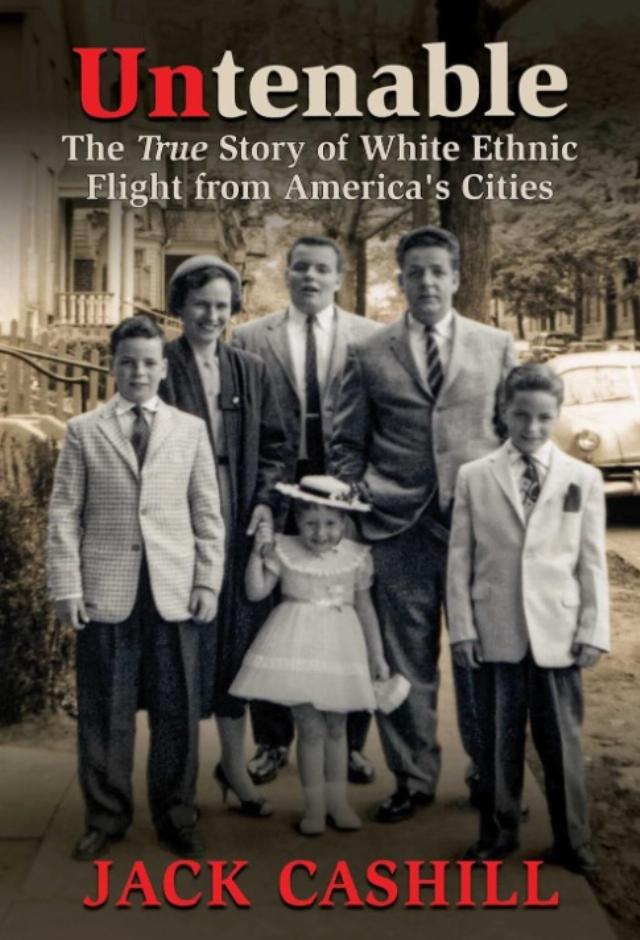Book Review: Jack Cashill explains how politicians destroyed American cities
Jack Cashill is one of the first Baby Boomers. Born in 1947, the son of an Irish cop, he grew up in a largely Catholic Newark, New Jersey, neighborhood. It’s hard to believe in retrospect, but Cashill’s childhood in the 1950s and early 1960s was idyllic, typical of urban life in a city that was, in those days, a vibrant and prosperous business center not far from Manhattan.
Cashill loved Newark enough to write a book about its demise in Untenable: The True Story of White Ethnic Flight from America’s Cities, which memorably describes urban decay and decline as seen through the eyes of a person who lived it. Although Cashill focuses on Newark, his story could have been told about scores of established big cities across America.

Cashill’s father was a Newark policeman and WWII vet who bought a fixer-upper for $4,000 on the GI bill. The Newark of Cashill’s childhood years was a good place to raise a family. You can see in his book his affection for Newark and frustration with what happened to his hometown. His story is painful to read, and I am sure was painful for him to recall and tell.
As Cashill tells it, what destroyed the thriving Newark of the 1950s were political decisions by people indifferent to the neighborhoods they were destroying. The growth of dysfunctional welfare families, most without a man in the house, resulted in a change that rocked the city. Rising crime rates made it so dangerous that responsible citizens reluctantly pulled up stakes and moved to towns that promised better schools and safer streets.
In short, living in Newark became “untenable.” Cashill was a witness to the changes. As a master storyteller, he makes this tragedy come alive through interviews with former residents and deep dives into the documentary record. Armed with data, he explains why working-class Newark residents had no option but to leave their community.
He lets old friends and neighbors tell their stories in their own words and never gets in the way. In the process, he destroys the bogus story that racism caused white flight, a favorite race-hustler meme that Cashill exposes in the book. Cashill knows the race hustlers and grievance peddlers well and contrasts their claims with the realities, vividly exposing the hoax.
Cashill’s research proves that white people left, not because of racism, but because of crime and violence, the great majority of which, unfortunately, blacks committed. Daniel Patrick Moynihan warned about the dissolution of the civil black family and traced that dissolution to the welfare programs intended to support fatherless children and their mothers. The devolution of Newark from a prosperous working-class city to a Third World hell took less than 20 years.
This book has many merits. It relies on strong evidence and compelling stories. Cashill’s affection for Newark and the people of Newark shines brightly. He tells the story well, but he does more. He provides commentary rooted in his sociological and political scholarship. Cashill is not just a good people person and storyteller—he has a powerful intellect that puts things together and makes connections that will make you smarter about America and the dynamics of this time and place.
Of his book, Cashill says, “Everyone with whom I spoke knew exactly why they left. It’s just that no one bothered to ask them.”
The book resonated strongly with me because, as an emergency room physician and a general practitioner, I have spent much of my life caring for minority patients. I’ve never regretted this work because medicine is an opportunity to make people well and relieve suffering. I never thought I should seek out a job that would allow me to avoid some color or ethnic group. I like seeing people of different backgrounds and origins, for they’re fun to talk to. The rewards of practicing medicine have nothing to do with race, color or ethnicity.
Jack Cashill takes the same approach to his people studies. He doesn’t categorize, generalize, or miss the fact that every human is a precious unit of humanity. His book displays Cashill’s love of people and his insights into what people do and why.
That makes him a great teacher.
John Dale Dunn is a physician and attorney, mostly retired.
Image: Amazon screen grab.
FOLLOW US ON
Recent Articles
- Deep Dive: The Signal Chat Leak
- Mark Steyn’s Reversal of Fortune
- Where We Need Musk’s Chainsaw the Most
- Trump Is Not Destroying the Constitution, but Restoring It
- The Midwest Twilight Zone and the Death of Common Sense
- Hijacked Jurisdiction: How District Courts Are Blocking Immigration Enforcement
- Transgender Armageddon: The Zizian Murder Spree
- Jasmine Crockett, Queen of Ghettospeak
- The Racial Content of Advertising
- Why Liberal Judges Have a Lot to Answer For
Blog Posts
- Amid disaster, watch Bangkok clean up and rebuild
- Katherine Maher shoots herself, and NPR, in the foot
- A visit to DOGE
- You just might be a Democrat if ...
- Yahoo Finance writer says Trump’s tariffs will see America driving Cuban-style antique cars
- Kristi Noem and the prison cell
- Dividing the Democrats
- April 2nd: Liberation Day and Reconciliation Day don’t mix
- Red crayons and hospital gowns
- The Paris Climate Agreement was doomed from the start
- Well excuse me, I don't remember
- Bill Maher goes civil
- Mass shootings: we're all survivors!
- Tesla and a second
- Snow White: a bomb for the ages






